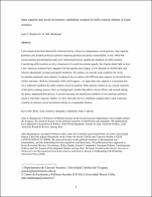JavaScript is disabled for your browser. Some features of this site may not work without it.
State capacity and social investment: explaining variation in skills creation reforms in Latin America
Fecha
2020Autor
Bogliaccini, Juan Ariel
Madariaga, Aldo
Metadatos
Mostrar el registro completo del ítemResumen
Latin America has been historically characterized by a focus on compensatory social policies, state capacity problems and unstable political coalitions impairing political and policy sustainability. In the 1980s-90s socioeconomic transformations and a new international policy agenda put emphasis on skills creation. Considering skills creation as a key component of a social investment agenda, this chapter sheds light on how Latin American countries have engaged with this agenda and a legacy of low demand for skilled labor and chronic educational coverage and quality problems. We analyze one crucial scope condition for social investment expansion: state capacity. Looking at four countries with different state capacity levels and diverse reform outcomes –Bolivia, Guatemala, Chile and Uruguay–, we argue that state capacity is a necessary but
not a sufficient condition for skills creation social investment. State capacity matters at two crucial moments of the policy-making process: first, as a background variable that affects reform efforts, and second, during the policy implementation period. A second necessary but insufficient condition is how partisan coalitions interact with policy legacies. Rather, we show that only the two conditions together allow Latin American countries to advance social investment reforms in a sustainable fashion.
Colecciones
- Capítulos de libros [11]


